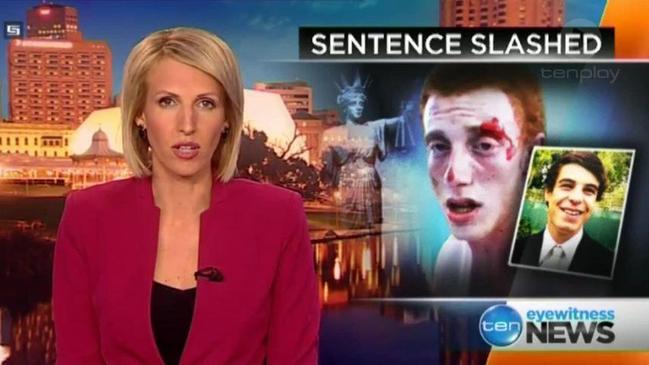SA killer Liam Humbles’ conviction for murdering Lewis McPherson to stand, but court cuts his non-parole period by six years
DRUNK and drugged killer teen gunman Liam Humbles has won a six-year reduction of his sentence — but his conviction as a murderer stands.

DRUNK and drugged killer teen gunman Liam Humbles has won a six-year reduction of his sentence — but his conviction as a murderer stands.
In a unanimous decision this morning, the Court of Criminal Appeal rejected Humbles’ claims he was guilty only of manslaughter because he was too drunk to have intended to kill teenager Lewis McPherson.
However, Justices Tom Gray, David Peek and Tim Stanley said Humbles’ 23-year non-parole period was excessive for a “unpremeditated, spontaneous” crime and reduced it to 17 years.
They said Humbles’ “severe” punishment must nonetheless promote his “potential for individual change and reform” while preserving his “individual redemption and dignity”.
That term was backdated to March 5 this year — when Humbles was convicted — making him eligible to seek release on parole in March 2031, aged 36.
After the court’s decision was announced, Mr McPherson’s parents, Mark and Kim, embraced in the public gallery.
“Any reduction was going to be too much, but I don’t really want to comment on that ... it’s bad, but it’s out of my control,” Mark said outside court.
“The conviction stands and that’s the important one ... Lewis’ family is reasonably satisfied with the outcome ... they’re certainly happy the conviction stands.”
Humbles’ parents, who also attended the hearing, did not comment as they left court.
SPECIAL REPORT: The new villains of South Australian crime
Humbles, 19, was jailed for life in March for one count of murder and two counts of attempted murder.
The sentence meant he would serve at least 24 years’ jail before being able to seek parole, including time already spent in custody.
Humbles had been found guilty at trial of shooting at and murdering Mr McPherson, and of shooting at and attempting to murder Liam Trewartha and James Lamont, on New Year’s Eve 2012.
Subsequently, The Advertiser exclusively revealed Humbles had used a .22 calibre handgun supplied by Charles Alexander Cullen.
A whistleblower then claimed SA Police knew, for 191 says prior to the murder, that Humbles was carrying the gun but failed to properly act on the information.
Meanwhile, Mr McPherson’s father, Mark, successfully campaigned for stricter gun laws.
During Humbles’ trial, the court heard Humbles was in an emotional state due to an argument with a friend and had a blood alcohol reading of between 0.252 and 0.284.
The court also heard that, after shooting Mr McPherson, Humbles pressed the gun into his stomach and said “if you don’t stop being dead, I’ll make you really dead”.
Humbles’ counsel seized on those points when appealing against their client’s conviction and “manifestly excessive” sentence in June.
They argued the teenager was too drunk to have formed the specific intent to harm anyone, and could therefore not be guilty of murder.
In their judgment today, Justices Gray and Stanley said the trial judge had accurately considered all medical evidence in the case and did not err when considering intent.
Justice Peek agreed, and Humbles’ appeals against his three convictions were dismissed.
Considering his sentence, Justices Gray and Stanley said Humbles’ crimes were “unplanned, unpremeditated and spontaneous”.
“Beyond the obvious context of alcohol and drugs, the defendant’s crimes are inexplicable,” they said.
They disagreed with the sentencing judge’s conclusion that Humbles was remorseless, pointing to psychological reports stating he was “shocked by his offending and regretted it”.
They further found Humbles was not given credit, in the form of a sentencing discount, for defending the charges only on the basis of intoxication rather than sparking a long, complex trial.
Justices Gray and Stanley said that, due to Humbles’ age, considerations of “care, correction and guidance” were paramount when setting a non-parole period.
“The fixing of a non-parole period for a young offender should acknowledge and promote the potential for individual change and reform,” they said.
“It should encourage good conduct while serving the mandatory life sentence and hold out hope for the offender’s future, consistent with notions of individual redemption and human dignity.”
They said the sentencing judge gave insufficient weight to those considerations.
“The offending was of the utmost seriousness ... a young man’s life was lost and two other lives were put in jeopardy,” they said.
“It was fortunate that more lives were not lost or more people seriously injured.
“The use of a loaded firearm in a state of gross intoxication was highly dangerous (and that he) had access to a firearm is itself a matter of grave concern to the community and law enforcement authorities.”
Justices Gray and Stanley said a severe sentence “was undoubtedly warranted” but the non-parole period must reflect his lack of premeditation and motive.
They said they would have imposed an 18-year non-parole period, reduced to 17 years to account for Humbles’ time in custody prior to trial.
Justice Peek agreed with that decision.
Outside court, Mark McPherson said he welcomed the end of the long ordeal.
“Moving on, I want to try and get on with my life a little bit ... I’m very pleased we don’t have to rerun the trial,” he said.
“My personal interest in trying to get unregistered firearms out of the community will be my focus ... we are making good progress with that in Lewis’s honour.”
